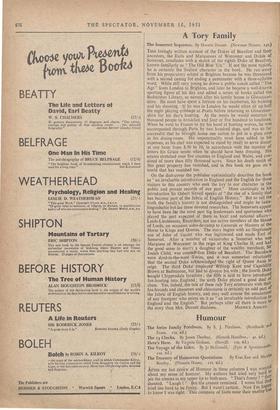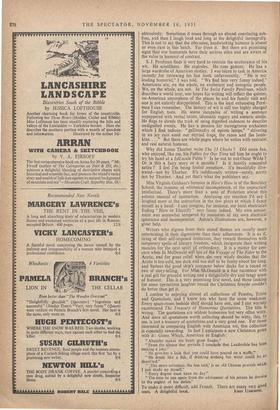Humour
The Swiss Family Perelman, By S. J. Perelman. (Reinhardt and Evans. 828. 6d.) AFTER my last review of Humour in these columns I waa worried about my sense of humour. My authors had tried very hard W pin the creases in my upper lip to both 'ears. "That's funny "the shouted, "Laugh I " But the creaseS remained. I wrote that thee tried too hard to be funny. But I wasn't certain. Now I'm hals to know I was right. This company of fools wear their motleyie
obtrusively; Sometimes it noses through an almost convincing sub- fuse, and then I laugh loud and long at the delightful incongruity. This is not to say that the obtrusive, hardworking humour is absent or even rare in this batch. Far from it. But there are promising signs that our humorists have their serious sides and are aware of the value in humour of contrast.
S. J. Perelman finds it very hard to restrain the exuberance of his wit, He scintillates. He explodes. He runs gamuts. He has a large wardrobe of American motley. I was taken to task in America recently for reviewing his last book unfavourably. "He is our leading humorist," I was told. "We find him very funny indeed." Americans are, on the whole, an exuberant and energetic people. We, on the whole, are not. In The Swiss Family Perelnzan, which describes a world tour, one hopes his writing will reflect the quieter, un-American atmosphere of the places he and his family visit and one is not entirely disappointed. This is the least exhausting Perel- man I can remember. The battery of wit is still too highly charged for English, taste. He seems incapable of writing a sentence unpeppered with verbal twists, idiomatic vagary and esoteric simile. He flogs to shreds the trick of using dignified cadences to describe undignified events. He has a passion for incongruous archaisms which I find tedious: "gallimaufry of opium lamps," "shivering In an icy rain amid our myriad traps, the ranee and the lamb- kins. ... But there are whole pages where he writes with restraint and real natural humour.
Why did James Thurber write The 13 Clocks? Did some fan, who enjoyed, like me, his Fables for Our Time tell him he ought to try his hand at a full-scale Fable ? Is he out to out-Oscar Wilds? Or is this a fairy story or a parable ? Is it heavily concealed satire ? I feel I'm being fooled somehow. It's beautifully illus- trated—not by Thurber. It's indifferently written—surely, surely not by Thurber. And yet that's what the publishers say.
Miss Virginia Graham's humour in Here's How is of the Benchley School, the humour of whimsical incompetence, of the unpractical intellectual. There's more than a note of Potterism about this solemn manual of instruction. Analysing my reaction I'd say I laughed most at the instruction in the few ploys at which I fancy myself as a hand. I can imagine, for instance, my local electrician finding "How to Electrify" very funny indeed. My own amuse- ment was somewhat tempered by memories of my own electrical ignorance and incompetence. Anton's illustrations are, however, a -great help.
Writers who digress from their stated themes are usually more entertaining in their digressions than their adherences. -It is as if, tiring of their self-imposed limitatons, they reward themselves with temporary spells of literary freedom, which invigorate their writing muscles for the next spurt of orthordoxy. It is a matter for con- cern when Jo McDonald will tire of the Voyage of The Eider to the Arctic, and for great relief when she very, wisely decides that the Arctic is too cold, too dark and too dull to be funny about for long, and battens the good ship's company below decks for a round or two of story-telling. For Miss McDonald is a fine raconteur with a real gift for graceful writing and a delightfully/dry and tangy sense of humour. This is a very promising first novel, and those looking for some uproarious laughter round the Christmas fireside couldn't do better than get it.
I confess to enjoying almost all collections of Pensees, Trivia and Quotations, and I know lots who have the same weakness. Every spare-room bedside shelf should have one, and I can warmly recommend The Treasury of Humorous Quotations. The title IS wrong. The quotations are seldom humorous but very often witty. And since all quotations worth collecting should be witty, this, to me, is just a treasury of quotations and a very good one. For those interested in comparing English with American wit, this collectioa is especially rewarding. In fact I anticipate a new Christmas game with it: Guess Which, American br English : "Absinthe makes the heart grow fonder."
"From the silence that prevails I conclude that Lauderdale has been making a joke." "He gave her a look that you could have poured on a waffle." "He drank like a fish, if drinking nothing but water could be so descri led." "',The more articulate, the less said,' is an old Chinese proverb vvifich I just made up myself." "Every dogma must have its day."
"The time he can spare from the adornment of his person he devotes to the neglect of his duties." To make it more difficult, add French. There are many very geed















































































 Previous page
Previous page